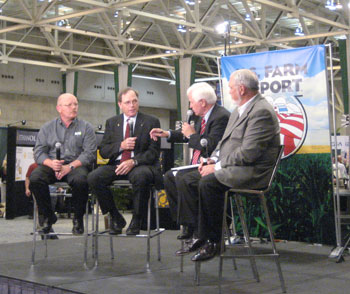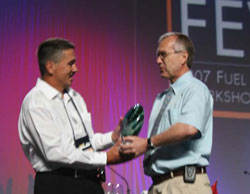 There’s a new player on the block in the alternative energy group sector: The American Biofuels Council.
There’s a new player on the block in the alternative energy group sector: The American Biofuels Council.
Sean O’Hanlon is the executive director for the new group that he says has gotten a better-than-expected response in their first few months of existence.
In an interview with energy.agwired.com, he explains that his council is different than other groups such as the Renewable Fuels Association or the National Biodiesel Board in that the American Biofuels Council focuses on end users and does not advocate for one particluar renewable fuel.
“The primary purpose of the (American Biofuels Council) is really to bring all interested parties together… not just the ethanol, the biodiesel… but also the hydrogen, the butanol, and to bring the government and end users together as well… to bring everyone to one table so that everybody has a chance to communicate opnely with each other and understand.”
“We don’t advocate one particular biofuel over the other. We really saw a need to have a unifying voice and that what was this developed out of.”
O’Hanlon says the biggest challenge for green fuels to overcome are inertia and disinformation out there. He hopes his group can help dispel some of the myths surrounding alternative fuels out there.
He adds, the fact that some of the big energy compnaies such as BP are starting to jump into the biofuels and other renewable energy games, should be a good sign for alternative energy in this country.
Check them out on the web at American Biofuels Council.com.
You can here the entirety of O’Hanlon’s interview by clicking below: [audio:http://www.zimmcomm.biz/audio/abc-int.mp3]


 Phillip Lampert, the Executive Director of the National Ethanol Vehicle Coalition, praised Congressman Stupak for offering the amendment. “We thank Congressman Stupak for his efforts, insight and acknowledgment of the need to move the federal government’s fleet of vehicles onto E85 and other renewable fuels,” Lampert said. “Bart Stupak has long been a leader on energy issues, and we thank him for offering this bi-partisan amendment.”
Phillip Lampert, the Executive Director of the National Ethanol Vehicle Coalition, praised Congressman Stupak for offering the amendment. “We thank Congressman Stupak for his efforts, insight and acknowledgment of the need to move the federal government’s fleet of vehicles onto E85 and other renewable fuels,” Lampert said. “Bart Stupak has long been a leader on energy issues, and we thank him for offering this bi-partisan amendment.” 
 Thanks to the
Thanks to the  The chief science officer for
The chief science officer for 
 The latest report from USDA’s
The latest report from USDA’s 
 Democrats in the U.S. House of Representatives have rolled out an energy plan during what they tout as America’s “Energy Independence Day.”
Democrats in the U.S. House of Representatives have rolled out an energy plan during what they tout as America’s “Energy Independence Day.”